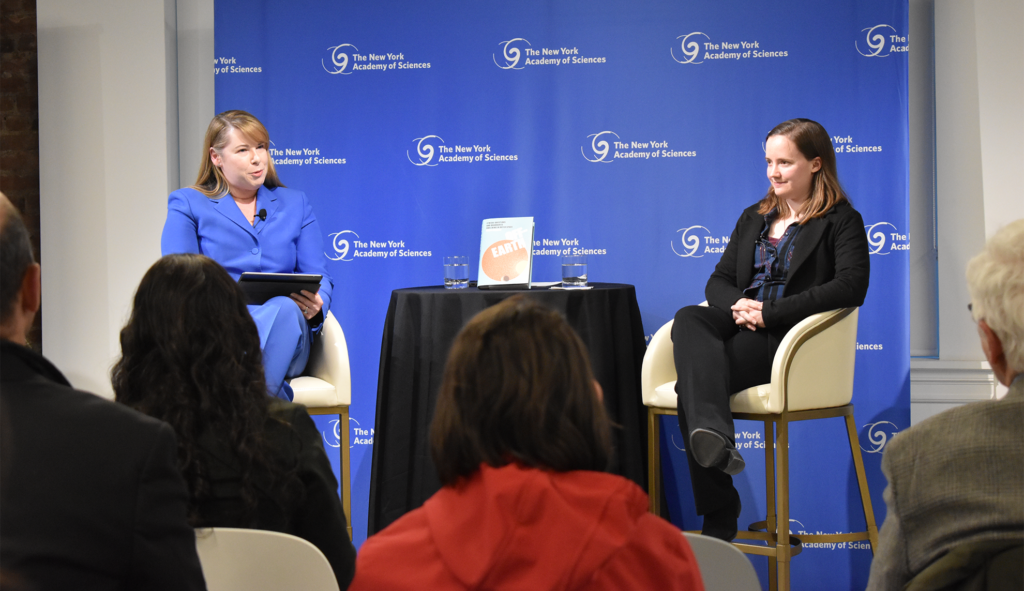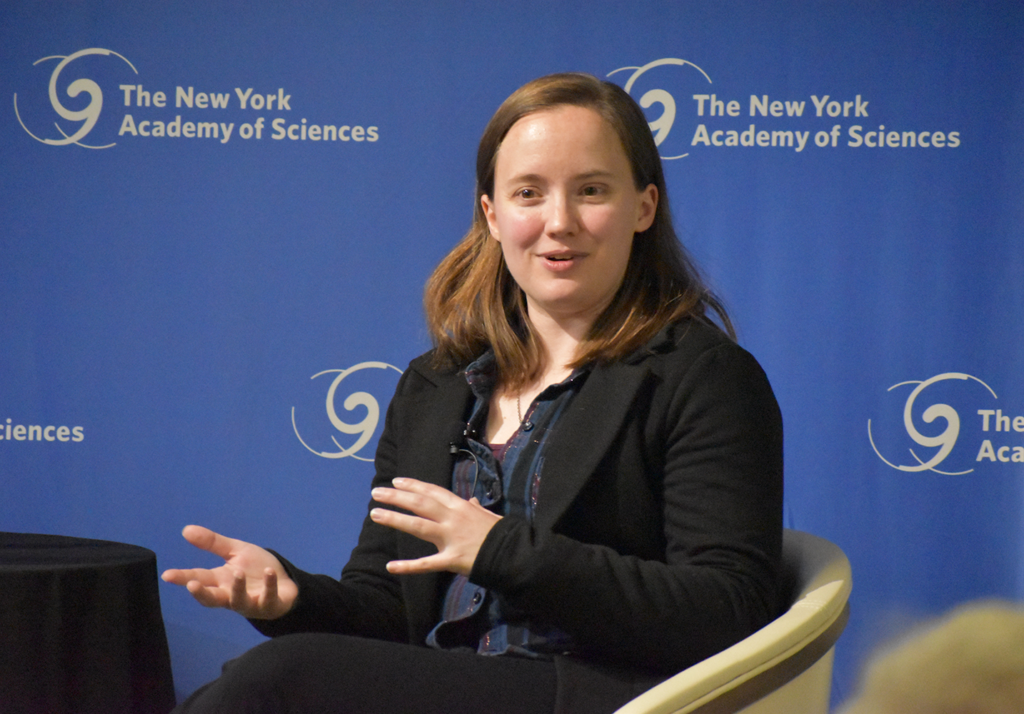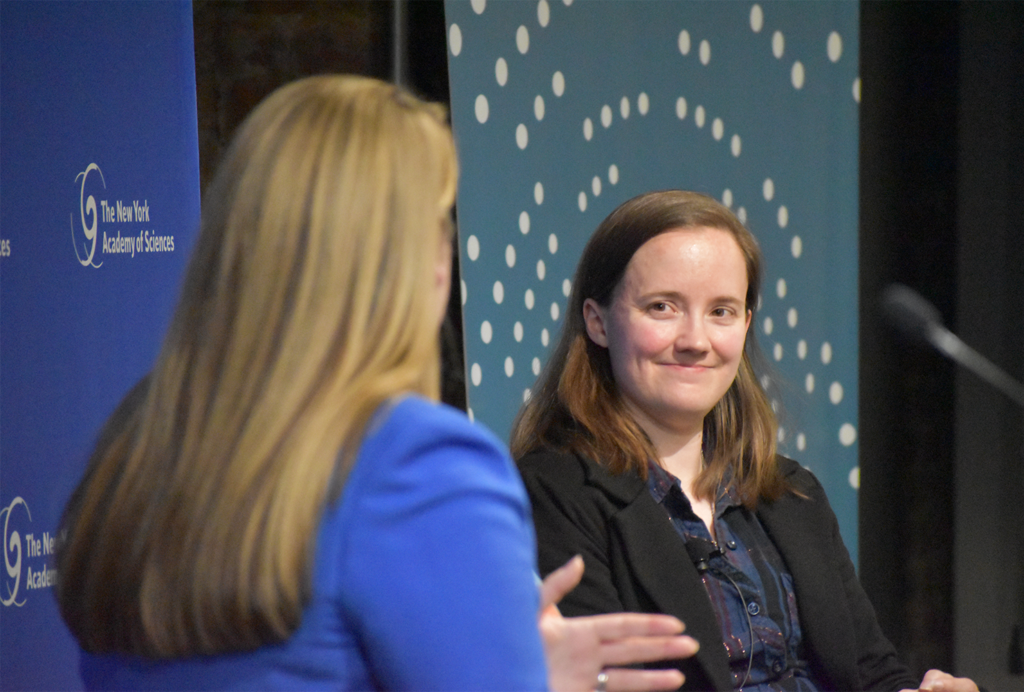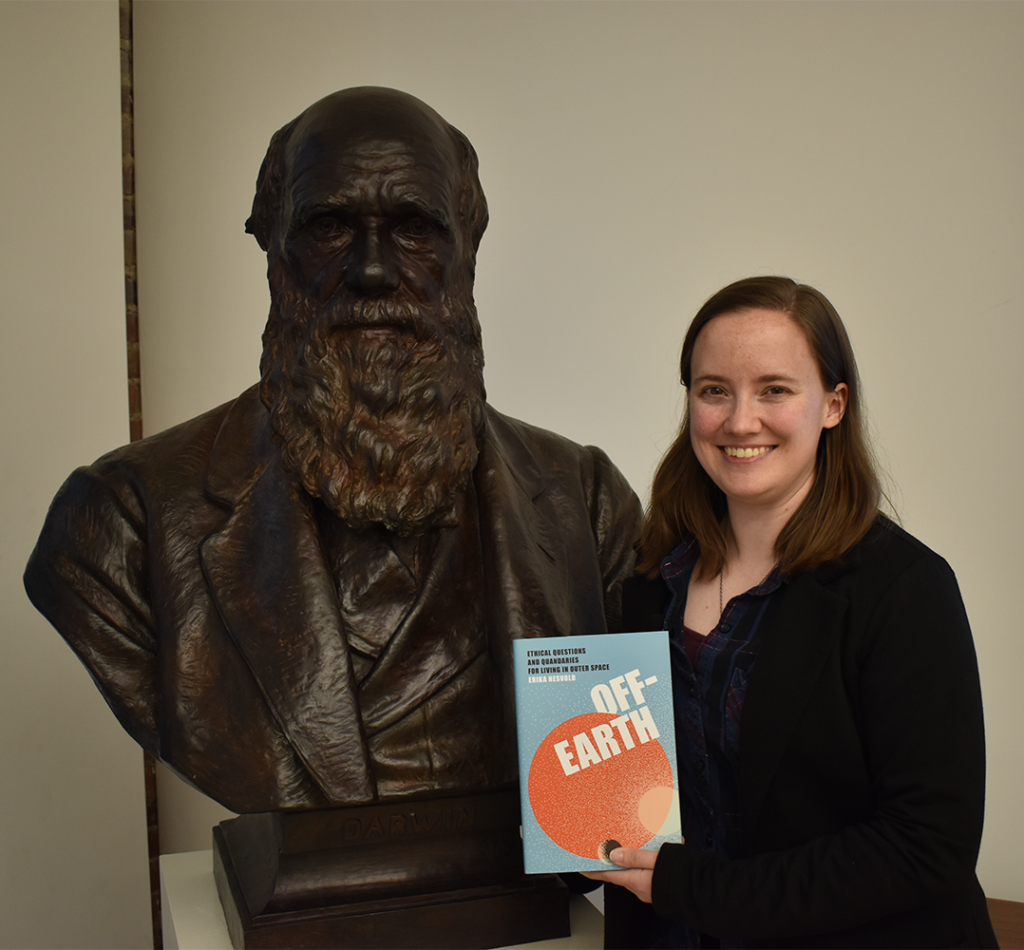Exploring the Ethics of Human Settlement in Space
While there are many scientific and engineering considerations that need to be applied to the human settlement of outer space, author Erika Nesvold argues in her new book that we mustn’t forget about the ethical and social justice dimensions.
Published April 15, 2024
By Nick Fetty
Digital Content Manager

Astrophysicist Erika Nesvold discussed her recently published book, Off-Earth: Ethical Questions and Quandaries for Living in Outer Space, during the second installment of the Authors at the Academy Series, moderated by Chief Scientific Officer Brooke Grindlinger, PhD, at The New York Academy of Sciences on April 5, 2024.
Finding Her Inspiration
Nesvold, who holds a PhD in physics from the University of Maryland Baltimore County and is cofounder of the JustSpace Alliance, began the event by discussing what motivated her to write a book focused on space ethics. While working at the Carnegie Institute of Science in Washington D.C. she traveled to Silicon Valley to do a six-week research program for NASA, focused on planetary defense, or as she put it “defending the earth from asteroids.” Through this, she met representatives from several prominent organizations in the emerging private sector space industry.

“I was excited because I’ve always been very interested in human space travel and the idea of humans living in space, and a lot of these companies said their goal was to get humans living in space,” said Nesvold. “But then when I talked to these entrepreneurs, I actually found I was kind of disappointed. I asked them questions about things that I thought were going to be a big deal [but they didn’t really have answers].”
Nesvold said she was concerned with issues like how explorers will make sure their mining equipment doesn’t contaminate the landscape and how labor rights will be regulated. She said the answer she often got was “We’ll worry about that later” and she felt this was not the proper approach.
As an astrophysicist she knew she didn’t have the background to answer these questions herself so she decided to launch a podcast to explore some of her ethical ponderings. The podcast was “moderately successful,” and with a new network of experts ranging from labor rights activists to historians to space lawyers, Nesvold turned her podcast miniseries into a book.
“I intentionally put questions in the title because it’s really more questions than answers, but we have to start somewhere,” said Nesvold.
Who Gets to Go?
Another element Nesvold addresses in her book is determining who gets to be part of the crews that go into space. Much like in broader society, Nesvold said diversity of experiences and backgrounds will be an important consideration when determining who goes.
She pointed out that the current criteria NASA uses for determining who goes into space is “extremely strict” and joked that she’s applied three times now and “never gets past the first stage.” The number of people who want to go into space exceeds the supply of vehicles that will get them there, and this was demonstrated when the majority of the event’s attendees raised their hands when asked if they’d be interested in traveling to space.
“There’s more people in this room [right now] who want to go to space than what they hired in the last round of astronaut hires,” she said with a smile.
Once the settlement of space becomes more feasible, Nesvold said many factors will need to be considered to determine who gets to be part of that initial cohort. Making certain this cohort has the proper expertise from engineers and doctors to plumbers and technicians will be essential, she said.

Additionally, Nesvold argues that the first cohort should properly reflect humanity. This would likely include individuals from all over the world. Gender balance will be important and perhaps even certain genetic issues will need to be considered if this cohort will be producing the next generation, but Nesvold cautions they don’t want to wade into eugenics. She said these early space settlers will need to find the middle ground between the utilitarian (“…if the settlement collapses, then none of this matters…”) and societal values like equity and accessibility.
Who Owns Space?
The Outer Space Treaty of 1967 was established during the height of the Cold War and Nesvold called it “miraculous” that both the United States and the Soviet Union signed it, considering the political hostilities between the two countries. The treaty itself aimed to establish guidelines that forbade nations from acts like appropriating territory or detonating a nuclear weapon in space. The intent was to avoid the wars and other conflicts seen during previous eras of human migration and settlement.
“I think that was good foresight,” said Nesvold. “What they didn’t think too far ahead about was what private companies would want to do.”
With the rise of the private sector space industry, this issue has been brought back to the forefront. Nesvold said that based on many current interpretations of the treaty, issues such as individual or even company appropriation of territory would still be forbidden. She said this can be problematic in capitalistic economies where private property rights are key to driving growth and innovation.
Various countries, including the US, have passed national laws that state while companies cannot own land in space, they can own resources they extract in processes such as space mining. She compared this to international fishing regulations that forbid individuals or companies from claiming territory in international waters, but they do own the fish they catch in those waters.
The Birds and the Bees
Eventually the settlement of outer space will require humans reproducing to maintain the population. However, given reduced gravity and other elements of the environment, scientists need to think about both the technical and the ethical dimensions of reproduction.

“Part of the reason this is still a big open question is because we don’t even know how to figure that out scientifically in an ethical way because almost every medical researcher and bioethicist you talk to will say it’s not a good idea to do medical experiments with pregnant people and fetuses,” Nesvold said.
Once the reproduction question is figured out, Nesvold said they’ll need to study if these children will be physically able to handle gravity if they return to earth. Additionally, given the scarce resources during the early missions, overpopulation can become an issue if not regulated. She pointed out that this will then lead to additional ethical issues around government overreach, bodily autonomy and eugenics.
Conversely, underpopulation can also become problematic if illness or another accident takes out part of the settlement. Reproduction could become necessary to sustain the population, which becomes ethically concerning if people are forced to procreate.
“This comes down to questions about an individual’s right to say what happens to their own body versus the society’s demands on them, which are all questions we face on earth as well,” Nesvold said.
For on-demand video access to the full event, click here.
Check out the other events from our 2024 Authors at the Academy Series
- Reid Hoffman – Impromptu: Amplifying Our Humanity Through AI
- Venki Ramakrishnan – Why We Die: The New Science of Aging and the Quest for Immortality
- Claudia de Rham – The Beauty of Falling: A Life in Pursuit of Gravity
- Arthuro Casadevall – What if Fungi Win?
Full video of these events is available, please visit nyas.org/ondemand
